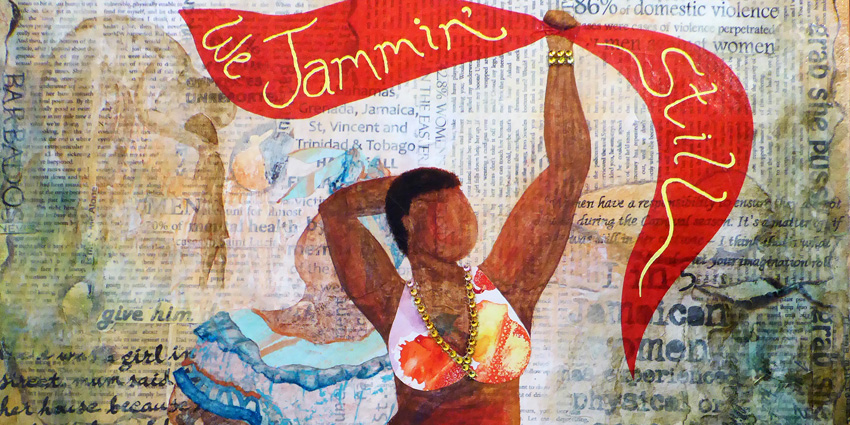
Featured Image: We Jammin’ Still by SLRoss
26 May 2022
Let me start by saying that this is not a review. I do not feel eminently qualified to review or assess the content I have just encountered at the Women in Carnival Symposium. I can talk about the presentation styles, the organisation of the experience for viewers, but the content? No way. These women know A LOT! When I grow up I want to be that well-read and knowledgeable about our culture… but it’s ok Stace, yuh working on it!
Below are the notes I scribbled during various speeches and panels. It is important to note that for the first hour of this conference I was driving children home from after-school activities, then having a family dinner, until I finally escaped to my room where I could give it my undivided attention… before being interrupted again for the most wonderful good night hugs from my 9- and 11-year-old ‘babies’. All that is to say, I probably missed a sizeable portion of the first half of this conference and as it’s in California on Pacific Time, I’m likely going to be asleep for most of the last half as I’m 8 hours ahead in Old Blighty. Still, Emily Zobel Marshall is one of my Dream Team of PhD supervisors, I was determined to attend and support.
So now you know the context of my listening experience. Bear with me as I just expand on thoughts and ideas that came up while listening to this conference. There isn’t a particular order to the ramblings below and this blog is more a place to note and work out how these ideas relate to me and my research. Now let’s dive into the notes.
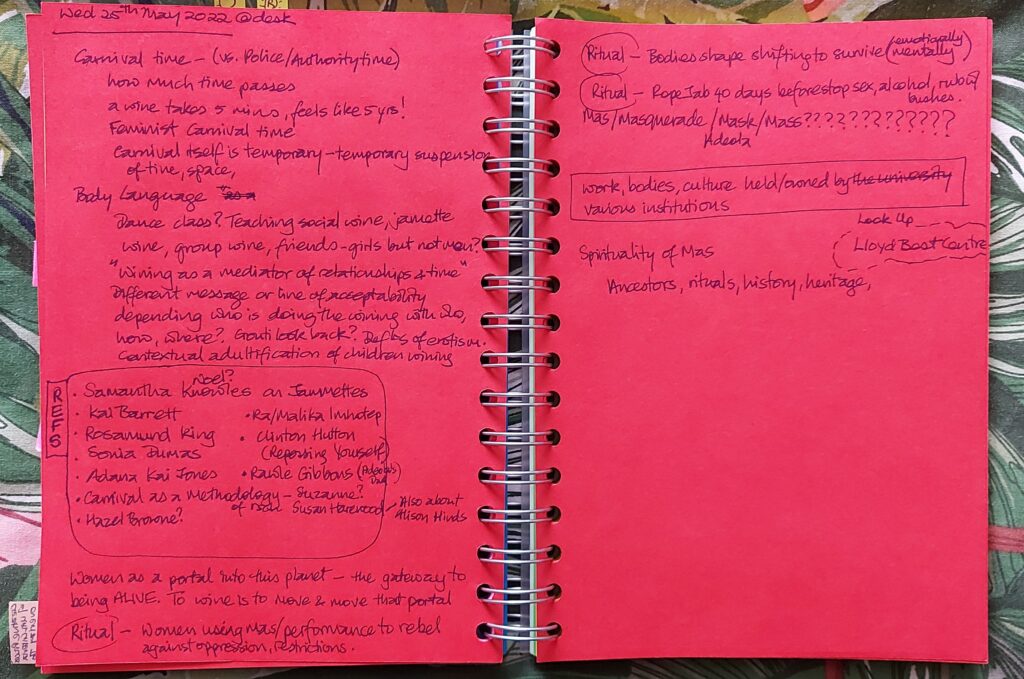
Carnival Time
I had already encountered the liminal nature of Carnival in Rebecca Solnit’s A Paradise Built in Hell (2014). In fact, the ‘euphoric oneness’ that I am seeking to re-create in my art intervention is so temporal that recreating it outside the bounds of an ‘actual’ Caribbean Carnival seems quite daunting. What I hadn’t considered that Ra/Malika Imhotep, Adanna Kai Jones and Dr Mireille Miller-Young put forward was that Carnival time is an alternative time that steps out of reality as not so much a disobedience (though it definitely is that) but almost a dismissal or shrugging off of attempts at control from authority. I think it was Adanna Kai Jones who referred to it as “Carnival time versus police time, institutional time”. Then she also raised the idea that time stretches and warps in the middle of a good tune or wine, which made me wonder how I could make time shrink, stretch or warp during my art intervention. That warping of time (and space), is that part of the ritual or route to the euphoric oneness I am seeking to recreate? They called this discussion Feminist Carnival Time and discussed writing a paper about it in the future. I know I’d line up to read that!
Body Language
Dance as a language doesn’t feel like a new concept to me but it did feel like coming home listening to them talk about the nuanced meanings.
What is it about knowledge that you live, that you don’t see it as knowledge? I know all this ‘stuff’ but I never considered it a language, a way to shape shift or code-switch. The versatility of a wine (gyration of the hips as seen at Caribbean Carnival) is just ‘obvious’ to me, so blindly, I didn’t give it a second thought. There is also, of course, the fact that having been through CXC (O’Levels/GCSE), GCE, a BSc, an MA, and a PgCert where I have been taught what is “worth knowing”. My Global South wisdom, grounded in culture and experience, is not included in the spoken and unspoken lists of valid data/knowledge. (Though, to the credit of emancipated minds in T&T and the UK, there have been decades of silent and purposeful erosion of this colonial canon, in small ways.)
So now in my PhD, I am deliberately un-learning this automatic dismissal of my experience. Deliberate disobedience, as Venus Evans-Winters (2019) would call it, disobedience as an act of validating qualitative inquiry that can accurately capture, analyse, translate and accurately report my Black female Afro-Caribbean experience.
And so back to dance as a language where you ‘write’ the moves and ‘read’ the context – A social wine doh mean the same ting as a hard wine, or a jamette wine, or a same sex wine, or a family wine, or a group wine or… you get the picture. Each wine and the context in which it happens changes the meaning. Adanna Kai Jones talked about “wining as a mediator of relationships and time”. I had never heard those thoughts presented so clearly before. I wonder whether we could teach the language of wining to the Carnival of Compassion audience? Nice idea and all that but what would be the specific purpose of this in relation to compassion and joy creation? Connection. Wining is having fun just moving your body, experiencing, playing, making joyful memories with your body. Wining with friends, lovers, family is a collective bonding within a relationship or community, it’s a celebration of physical power over yourself, it’s an energy exchange as you make ‘magic’ together. At the end you leave tired but happy with all the endorphins of exercise, the joy of connecting with others, and a love for your body’s ability to facilitate that experience for you. I have never before interrogated so diligently why I love to wine.
(Normally in a discourse like this I would add a million citations to back all this up but right now I want to get this up on the cite, and I’m not actually ready to dig into the dance literature yet. There are a few more urgent items on my reading list at the moment. Anyway, let me finish this while it’s still fresh in my head… )
But why stop at dance? What other native languages do I speak that I have dismissed? How can I use those languages to communicate in my intervention? Do they cross socio-cultural borders easily?
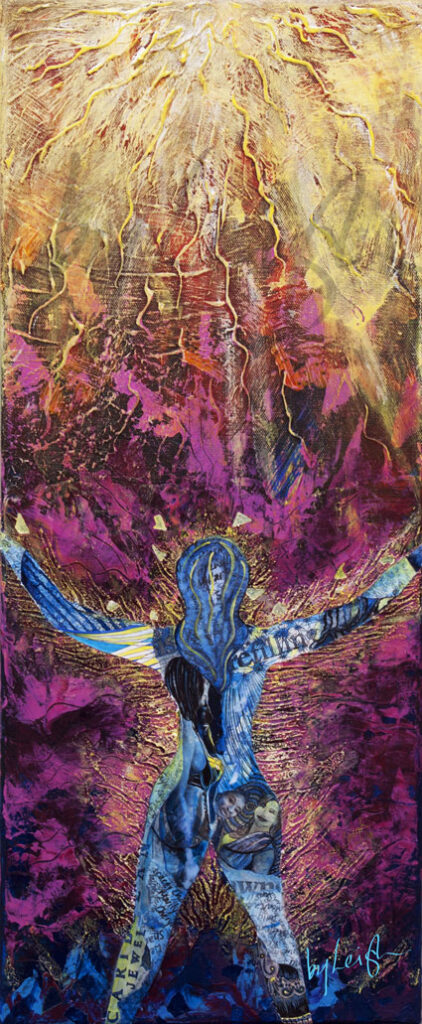
Female Magic
Writing the word ‘magic’ in any sort of academic writing, even my blogs where I’m just working out my thinking on things, feels like some kind of blasphemy that will cause the academic gods to smite me. Maybe the academic gods need to go find their own magic… but that’s a different PhD. Anyway, I think it was Ra Malika Imhotep who said that within a woman’s body is a portal to this planet, a gateway to life. Until you come through a woman, you are not alive. Women are how every person on this planet has come alive. Facilitating life, tell me that aint some powerful magic. Imagine the gall of Black women to take the seat of that power and wine/gyrate/wave it around politely, scandalously, joyfully, viciously, mischievously, however we like! What an act of rebellion against systems and institutions that continuously try to strip our control over our bodies. Talking to a fellow doctoral researcher today, she said, “that level of power must terrify them [men] so they try to control us [women] to control that power, but how you go tell me what to do with my body?”
This brings me right back to slavery – attempting to own and control the bodies of sentient beings for personal gain, to feel successful and accomplished according to a standard that rates extrinsic rewards (money, power, fame…) over intrinsic rewards (connection, love, self-worth…). It didn’t work then and it won’t work now. People will always rebel. It may take them time to succeed but they will rebel and each time you have to smash them down to maintain your illusion of power, you break something in yourself. No one wins. Imperial thinking demands I forcibly subjugate someone and make them create value for me to benefit, but what if I created my own value? In fact, why would I not create my own value? Do I not believe that I have something valuable to offer? Which brings me right back to my belief that people who are confident, resilient and secure in their worth (not net worth) do not need to push others down to lift themselves up. In fact, they achieve higher heights by bringing others up with them, and this is the crux of Carnival of Compassion. My audience needs to be self-compassionate first, feel the joy of being compassionate towards others and themselves second, then recreate that joy repeatedly in their families and communities by continuing to be aware of where they can find opportunities for self-compassion, compassion and joy. Then be strong enough to seize them.
Put like that, this feels like an impossible ask for a one-off experience, but if my one-off art intervention experience makes one person take their first (or next) step on this journey, I’ll consider Carnival of Compassion a raving success.
And that,
Would be my Stacey magic!
Individual Notes
Renella Alfred – The Whip Princess
A young woman of so much conviction, fire, passion, ambition and heart. Wow! I could feel her love and devotion to her artform through a zoom meeting connection. She was fierce and proud and articulate. Yes, articulate. I know many who would disagree because of her liberal use of ‘green verbs’ (T&T slang for bad grammar, particularly incorrectly conjugated verbs) but they would have to work damned hard to ignore her clear message of legacy, commitment and spirituality. Who have eyes to see, leh dem see. Who have ears to hear, leh dem hear. Renella is absolutely a bonafide Princess, and she earned her crown.
Adeola Dewis
She is Rawle Gibbons daughter? A nex’ princess! That there is generational Carnival wealth in practice and academia. Wow! When her definition of mas played with the concepts of masquerade and mask, I was nodding like a this was a Sunday service and the preacher was sermonising, but then…
Eintou Springer
Talked about her ancestral conversations and the guidance they have given and continue to give her to develop and share her practice with her community and the world. It made me remember explaining my project to Dr Michael McMillan when I was trying to woo him to be my supervisor and he said “Stacey, this is spiritual”. I felt so seen and valued. It reminded me too of Renella’s rituals for Rope Jab 40 days before she plays her mas and I thought…. Spiritual…
Mas
Mas = Masquerade = Mask = Mass = this communing of body, mind and soul on the road, under the sun, in communal worship. Best church ever!
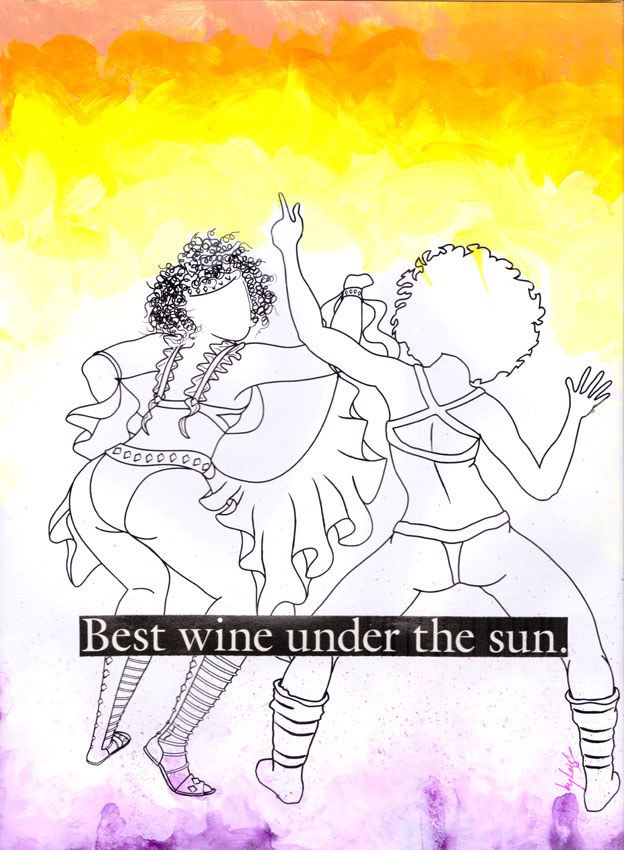
Reading List
Doh talk about all the names of people I need to add to my reading list. Here are only a paltry few I could write down quickly enough!
- Samantha Noel (great work on Jamettes)
- Kai Barratt
- Rosamund King
- Sonja Dumas
- Clinton Hutton
- Rawle Gibbons
- Susan Harewood
- Hazel Browne
- Kwame Ture
- Lloyd Best
I already knew some of these names like Sonia Dumas, Rawle Gibbons, Hazel Brown and Lloyd Best but I think I needed to be reminded to go check them out.
Summary / Next Steps for Carnival of Compassion
Time – How could I make time shrink, stretch or warp during my art intervention? That warping of time (and space), is that part of the ritual or route to the euphoric oneness I am seeking to recreate?
Dance – ‘write’ the moves and ‘read’ the context
Languages – What other native languages do I speak that I have dismissed? How can I use those languages to communicate in my intervention? Do they cross socio-cultural borders easily?
Definitions – Mas = Masquerade = Mask = Mass = Spiritual = Ritual
Audience Experience – My audience needs to be self-compassionate first, feel the joy of being compassionate towards others and themselves second, then recreate that joy repeatedly in their families and communities by continuing to be aware of where they can find opportunities for self-compassion, compassion and joy. Then be strong enough to seize them.
Measures of Success – If my one-off art intervention experience makes one person take their first (or next) step on this journey, I’ll consider Carnival of Compassion a raving success
References
Evans-Winters, V.E. (2019) Black Feminism in Qualitative Inquiry : a Mosaic for Writing Our Daughter’s Body. Abingdon, Oxon: Routledge. Available at: https://doi.org/10.4324/9781351046077 (Accessed: 1 May 2022).
Solnit, R. (2014) A Paradise Built in Hell: the Extraordinary Communities That Arise in Disaster. Audiobook. Audible Studios. Available at: https://www.audible.co.uk/pd/A-Paradise-Built-in-Hell-Audiobook/B00N1ZBEJ2 (Accessed: 21 November 2020).
Women in Carnival, (2022). [online conference] Zoom. 25 May Available at: https://tinyurl.com/carnivalweb [Accessed 25 May 2022].
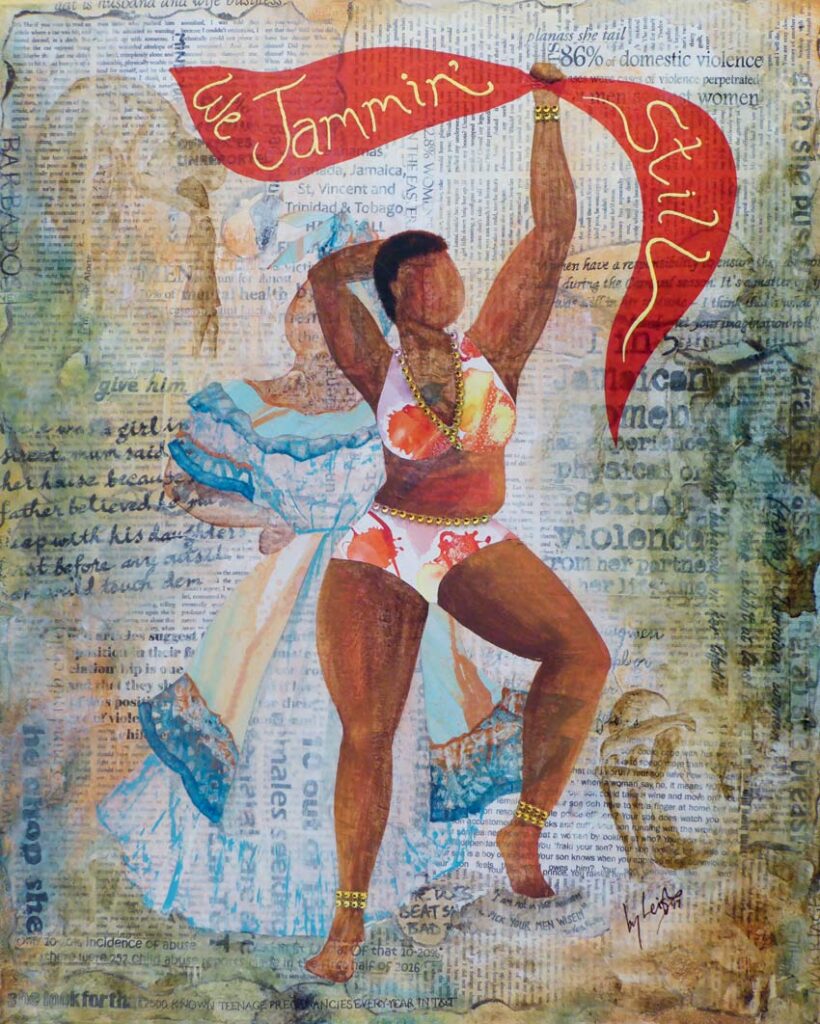
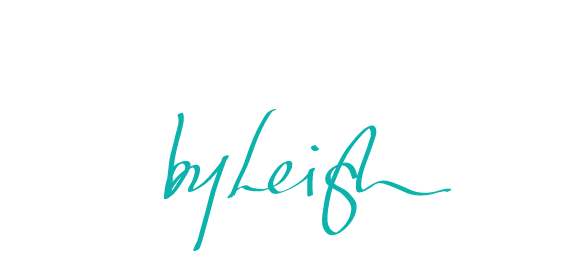
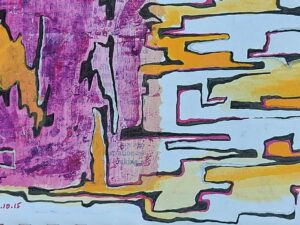
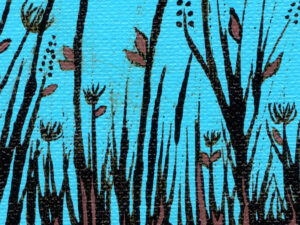
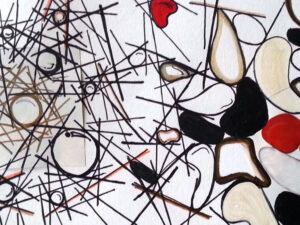
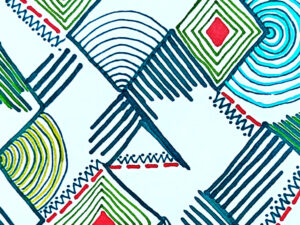
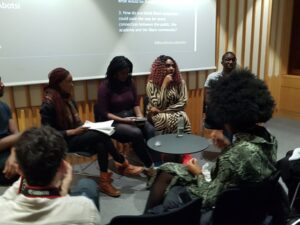

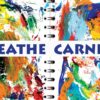
Exhibition Review – Blowtorching the Bitten Peach